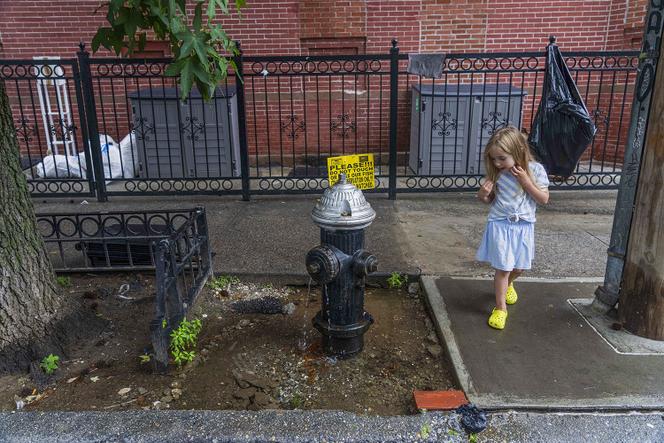


In summer, ephemeral fountains sputter through the streets of Brooklyn. In Bedford-Stuyvesant (also known as "Bed-Stuy"), a historically African-American neighborhood, residents have taken to unscrewing fire hydrants to cool off in the heat. Since August 3, leakage from one of these hydrants has fed a puddle formed in the hollow of a broken sidewalk. Here, 100 goldfish wriggle timidly between shells and plastic water lilies. "This is the most famous pond in town, and even in the US," said Gavin, 35, a native of the area. The unemployed man, who didn't want to give his surname, was behind the project: "The idea was to bring neighbors together and beautify the neighborhood."
From Texas to Great Britain, from Venezuela to Japan, tourists now come all the way to Bed-Stuy to discover this makeshift pond, already listed by Google Maps, whose images have been circling the internet. On the spot, curious people exchange a few words with others they'd never have spoken to otherwise. With mules on her feet and a latte in her hand, Ana Tuazon, a writer from New York, regularly comes to collect herself in front of the pond and converse with passers-by. "In a place as stressful and crowded as New York, this whimsical installation is a unifying element," she said.
But Gavin's idea hasn't been to everyone's liking. On the morning of August 8, two neighbors, Max David, 32, and Emily Campbell, 29, fished out about 20 fish, fearing for their survival. "I'm aware of the visual aspect of the situation: a newly-arrived White woman [in Bed-Stuy] chaptering an older Black man, but I have a hard time with animal cruelty," Emily said on the social media network Reddit. Some Internet users have seen it as an illustration of the socio-racial tensions that are stirring up this rapidly gentrifying borough. On August 9, the New York Times seized on the affair and spoke of "a neighborhood conflict that has spread far beyond its point of origin," going beyond the opposition between pond protectors and animal defenders.
Sitting on folding chairs, Gavin and a dozen or so of his childhood friends fiercely guard the pond. Armed with a joint or a punnet of French fries, they take turns there every day, sometimes even at night. The sentinels hand out lollipops to local kids who marvel at the aquarium they don't have at home. And, like them, they hope to maintain the pond. "We're waiting for the green light from the town hall, but we'd like to buy the equipment and materials needed to install the fish for good," Gavin said. And when winter comes, when rain threatens to overflow the pond? "We'll take care of them. We'll still be here."
